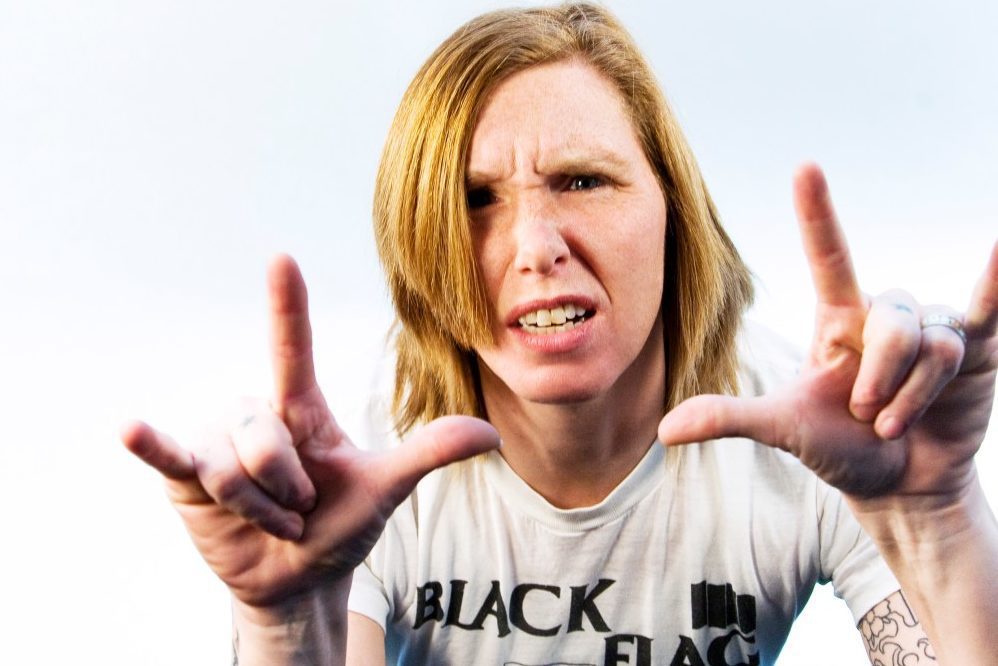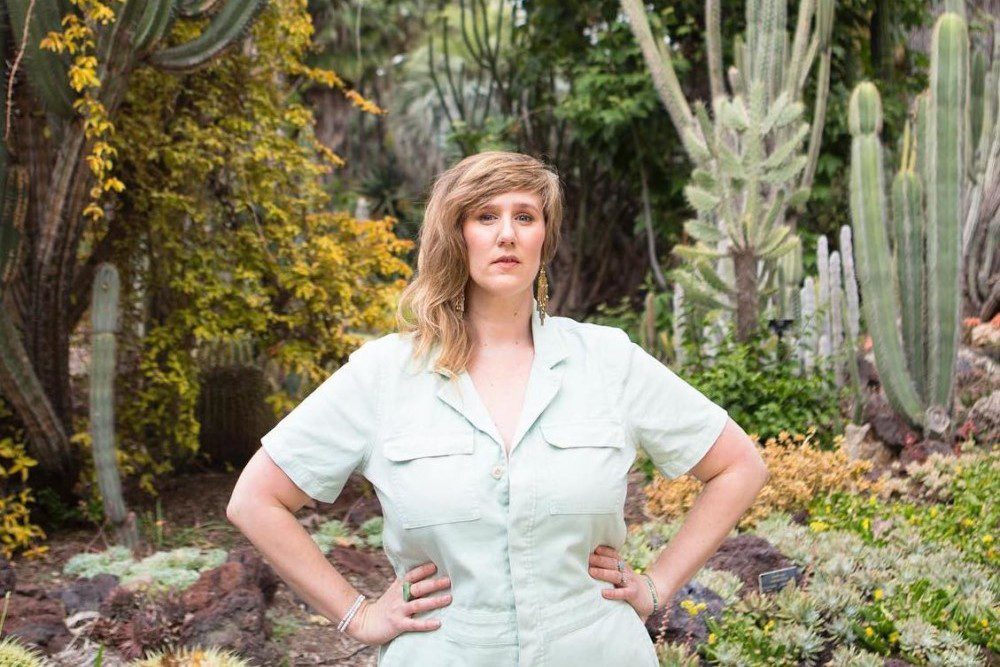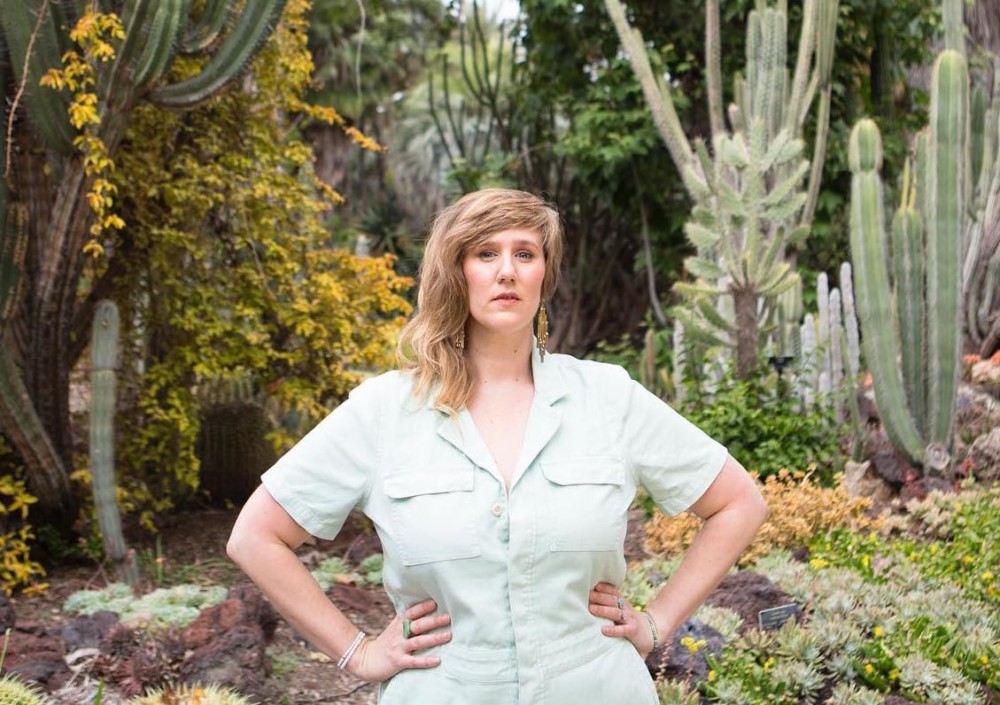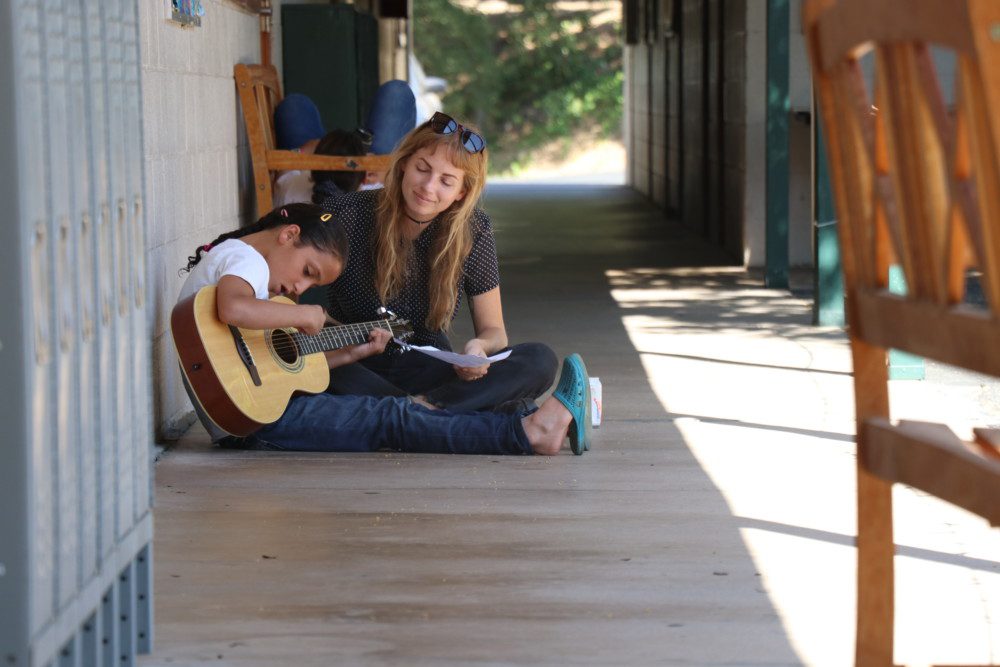Patty Schemel in Quarantine

This year, Girls Rock Santa Barbara has developed The Summer of Love Internship, its first ever paid internship for teen girls and gender-expansive youth, which allows the organization to continue to provide a safe, collaborative environment in which to encourage lifelong skills like positive peer bonding and self-confident resilience. The internship, which lasts six weeks and pays each intern $500, offers six exciting and arts-focused disciplines: Record Label, Recording Artist, Social Media, Journalism, Photography, and Podcasting. Audiofemme is pleased to publish the following article, written by Julia Duva and Emelie Sanchez, two interns from the Journalism program.

“Sorry if my audio cuts out,” Patty Schemel apologizes as she joins our scheduled Zoom call from the passenger seat of a moving car. Introducing herself while the world flashes by behind her and the bumpy roads shake the camera, she quickly explains that she’s on her way somewhere and will only have about half an hour to talk. It seems fitting that she’s in her car, doing an interview, while already on the way to some other engagement; Schemel was never the type to sit still. That’s part of the reason why she started drumming when she was just twelve years old – it was a loud, fast, and efficient way to burn energy and work through her stress and anger. She continued with this unique type of therapy for the majority of her teenage and adult life, playing in several different bands and on countless other studio recordings over the years.
Having been in the music industry for a few decades, questioned constantly about the ’90s and her former band Hole, Schemel was excited to take a break from analyzing her tumultuous past to talk to us about her current band, Upset, how she is dealing with quarantine, and her new passion projects.
For the past four months, Schemel has been on a break with Upset, which dropped their third album just last November, after five years of no new releases. Because of the break, she has been working on other music-related ventures. Many artists are having to find new ways to make music without actually being in a room with a band. “You can really record drums so easily today,” she confirms. “Like, just play a beat, record it, put it into your software, and double it a bunch of times. It’s not so organic. You don’t hear a lot of real drums anymore.” While this new way of making music is exciting, it can have its downfalls. “It’s frustrating because I can’t just make a sound come out by…you know,” she says, while making a drumming motion with her hands. “It’s a new way of thinking about making music which is interesting and exciting. And that’s what my focus has been.”
Despite having made music with her computer, Schemel admitted that she hadn’t played the drums in a few months. Drumming has always been her way to de-stress and escape, so four months into the pandemic, she picked it up again. “You know, just on Saturday, I set up my drums and played them for the first time in months. And I forgot how good it makes me feel,” she says. “It grounds me and gets my mind to think in different ways and it’s a good workout. So I am going to start doing that more.”
Since musicians and performers rely on a gig economy, where income is based on one-shot performances or touring, the recent shutdown has affected many independent artists, including Schemel. “Right now is such a fertile time to rethink what we do as musicians and performers,” she suggests. “I think the fact that we can stream [music] and create it in our bedrooms is so great now. So we have to think: will we be able to make a living playing music? And how do we repackage it or rethink performing? Is it screens?” Schemel’s punk-oriented work with Upset doesn’t quite fit into the category of “Bedroom Pop,” but she and other artists might look to the genre which has set an example for producing and releasing music from home.
While taking the time to focus more on herself, her close friends, and her family, Schemel has been working on some more personal projects. As the population began sheltering at home, people became invested in baking bread, playing Animal Crossing, and binging Money Heist. Schemel, instead, started a podcast, still unnamed, which will hopefully be released soon. “It seems like everybody has a podcast,” she jokes. “I have just been thinking about what is gonna make my podcast unique. It is me interviewing women who play music and talking about why they did it and talking about creating their work. And how, in the ’90s, there was that wave of feminism in music and then it just sort of died down. What happened? What can we do today?”
Along with her podcasting, Schemel has been teaching woodworking to children, which she began when she met a woman through her daughter’s school that was hoping to collaborate on classes. “I like the idea of making something, working on it start to finish, making it with my hands. It’s not plastic and it’s not a screen. You don’t plug it in. It’s just a piece of wood and you put it together,” she explains. For her, woodworking was the perfect creative outlet – next to playing the drums. And Schemel loves working with kids – she describes her students as “my own group of friends who are between five and seven [years old].” She is also a drum coach at the Girls Rock Los Angeles summer camp. Though she may not have understood what she was getting herself into, when she realized she’d be able to teach young girls to play the drums, she was able to be the role model that she needed as a child.
“[Girls Rock] spoke to eleven-year-old me – the girl who wanted to play drums, who had a really hard time navigating the world as a girl who wanted to play drums, the girl who had a hard time going into the music store afraid of getting drumsticks because I was always looked down on,” she says.
Now, Patty Schemel has grown comfortable being a role model. “I have had fans say, ‘Thank you for coming out, and being an out gay person in the ’90s.’ When they come up and say that, I feel good,” she says. “And other people who are in recovery like myself – I don’t drink or do drugs and I am pretty open about that, so people come and talk about that being the thing that helped them when I wrote about it in my book.” She paused and thought for a minute. “So it’s really those two things that, when I hear them, it’s a good reason to be in the world, that I did that for people.”




